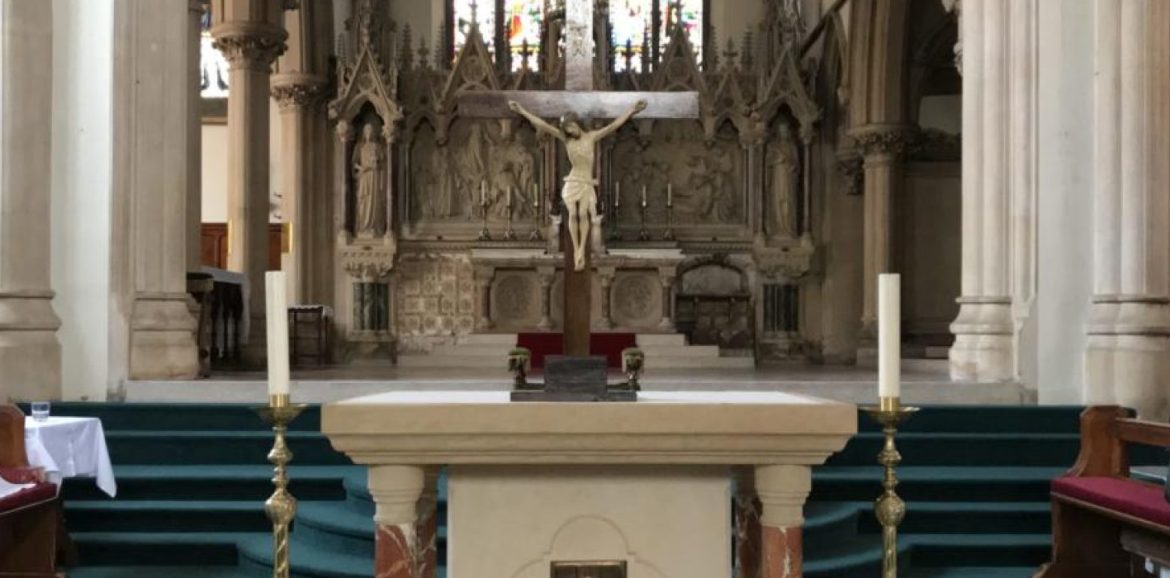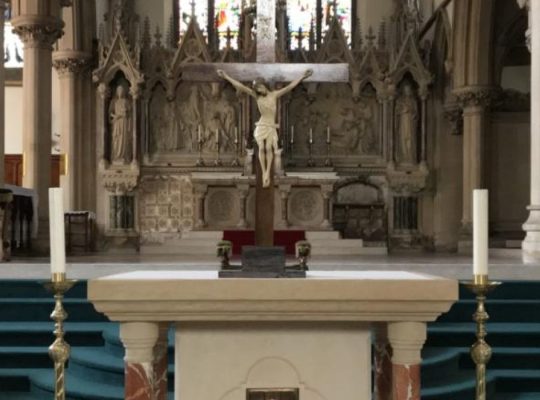Just a Thought
“Here begins the Gospel of Jesus Christ, the Son of God.” Thus begins the Gospel according to Mark, the first page which we hear in our Liturgy today.
To speak of a “beginning” normally implies an end that is more or less near, more or less certain. This is not the case in the Gospel according to Mark. This short book stops abruptly and unexpectedly with the discovery of the empty tomb “on the first day of the week” by Mary Magdalene, Mary the mother of James, and Salome. They made their way out and fled from the tomb bewildered and trembling; and because of their great fear, they said nothing to anyone.
We, of course, know that this is not the end. By ending this way, Mark doubtlessly wants to make us understand that each of us must continue the story thereafter with the personal response that we make to the “mystery” of the empty tomb. The evangelists story stops abruptly, as if suspended, which invites others to “begin the Gospel of Jesus Christ, the Son of God” in light of which they must now live until the Lord comes again. (Ourselves included)
The Gospel is not a closed, private matter. Always proclaimed in a new manner, it must be read in the present, in following the one who has already come, and in expectation of the one who will come. The Liturgy in which the Gospel is proclaimed turns out to be the celebration of the mystery of salvation that comes in our time and in which we have a share.
“The word of the Lord is peace for his people.” Peace, a summary of all the benefits of the messianic age, is associated with salvation in the New Testament. Because the Father of our Lord Jesus Christ is the God of peace, and Christ himself is our peace, and his Gospel is the good news of peace.
At Bethlehem the angels sang: “Glory to God in the highest heaven, and peace on earth to those on whom his favour rests” to those whom he has shown “kindness and love.” But we also partake of it in the season of Advent, asking God to show us his love and give us his salvation, which have yet to be manifested in their fullness.
The wait for the last coming of the Lord remains at the heart of faith, even after Christ’s first coming. One must realise that this does not preoccupy the minds of many Christians today; whereas in the early Church, the faithful were somewhat frantically inclined toward the imminence of the final days. Certainly, there is always the possibility of a planetary catastrophe: “The heavens will vanish with a roar; the elements will be destroyed by fire.” But this fear, which we try to exorcise anyway, has nothing to do with waiting for the coming of the Lord. The exhortation of the Second Letter of Peter, which we read today seems not to concern us at first. But the impression does not last long. The six verses prove themselves to be a source of great riches for faith and for life. Moreover, it seems to be of great importance precisely at this time when the prospect of the final days hardly seem to matter to us. We must remember last week’s warning: “Stay awake.” Because God will remain faithful to his promise, the day of the Lord will come, and it will come like a thief, that is to say, suddenly. This is the whole mystery of Advent that is once again affirmed.
Does time, then, stretch out without any end in sight? There will be an end to time. But we should not be impatient at the patience of God. This in-between time of the two comings of Christ which we find ourselves in, is an instance of the patience and mercy of God. “He wants none to perish but all to come to repentance.” Because of this, we are able to return to the serious concern of our present life and responsibility. “So beloved while waiting for this, make every effort to be found without stain or defilement, and at peace in his sight.”
The mention of a possible cataclysm in which the heavens disappear, the elements are destroyed by fire and “the earth and all its deeds will be made manifest,” is not a prophecy of evil. These violent cosmic upheavals are those that will accompany the birth of a new heaven and earth where justice will dwell. This world, though it is “to be destroyed,” will not be annihilated; on the contrary, it is promised a marvellous future. The Second Letter of Peter takes up and extends the prophecy of the Book of Isaiah. In fact, it makes clear that there will be a continuity in the change between the heaven and earth that we know and the new heaven and earth that “we await according to his promise.” It also says that the “adventure” of this world and of all peoples has a meaning, that it moves toward an end that we must not fear but prepare and hope for. Each person knows, in a sense, what is to be his or her fate at that moment, because it is the responsibility of each to do what is necessary for that day to be a personal day of salvation.
Believers are told to witness to this hope. Not only by what they say, but above all by what they do and are, the holiness of their life, their respect for God and the works of the Creator that has been entrusted to them. Under their eyes, by the work of their hands, by their personal involvement in all areas of life—political, social, etc.—a new world is coming into being. Such is the mystery of Advent that we participate in. Such is the good news that we hear in our Liturgy and look forward to in hope.
The good news is not imposed by force: it requires the free acceptance of those who hear it. We will find that the ground in which the seed falls is not prepared for all time by the prophets and the precursors of old, by the traditions to which one belongs, by whatever is the soil’s natural disposition: the good earth can become a wasteland if it is not constantly cultivated. We must prepare for the coming of the Lord. We must also make straight his path.
Today we see the entrance onto the scene of John the Baptist, the model prophet-precursor. John the Baptist came, and the multitudes crowded together on the banks of the Jordan where he preached to them and baptized them. But not all turned so quickly toward Jesus— far from it—when he in his turn proclaimed: “This is the time of fulfilment. The reign of God is at hand! Reform your lives and believe in the Gospel.” His words must have sounded extreme, to a people who would readily accept a prophet; but here is one claiming to be the Messiah. Later; though, the enthusiasm of the crowds later crushed upon him from all over—from Galilee, Judea, Jerusalem, from across the Jordan, Tyre, and Sidon, etc. they witnessed his miracles, listened to his teachings— despite this Jesus was left with only a handful of disciples at his death. Yet he never gave up teaching and performing miracles. And today we see the millions of followers he now has.
Since the day of Pentecost, the newborn Church has known an extraordinary mission. The Gospel has been preached to all nations by the original apostles and their successors. But some Churches that once flourished are now only a memory. Others, as a result of sometime dramatic crisis, have become so indifferent that one might ask: “Have you forgotten your baptism?” On the other hand, in some countries and even on entire continents, we see some young Churches becoming models for longtime Christians who seem to be running out of steam. Contemporary life and ancient history both bear witness to this: the reception of the good news, the vitality of the Churches, their internal and missionary dynamism will require precursors, leaders who will prepare the way of the Lord and make straight his path, prophets and saints to nourish and quicken the faith of believers, whether new or longstanding. Without them— we see it only too well— the old idols reappear and impose their dominion anew: hate, injustice, egoism, and indifference regain the upper hand; people become progressively more inhuman, oblivious to the impact of the good news and incapable of receiving the Spirit who frees and sanctifies.
John the Baptist is the model of the prophet-precursor who is at all times conscious of his mission, but who also possesses an exemplary humanity. He never does or says anything that would focus attention on him rather than the one he wishes to focus upon. On the contrary: “One more powerful than I is to come after me. I am not fit to stoop and untie his sandal straps, I have baptized you with water, he will baptise you in the Holy Spirit.”
We find in this serene humility a certain quality that allows one to recognise a true prophet. John does everything in his power to prepare the way of the one, but he puts himself in the background. John the Baptist speaks and acts as if he had already heard and meditated on the parable of the master and his useless servants. He accomplishes his mission: that is enough for him.
The world and the Church always need such prophet-precursors who call for conversion. Wherever they appear, there is the “beginning of the Gospel” for those who do not yet know Christ. In the Church, in the Christian communities, at the heart of all renewal, of all new beginnings, we find prophets, sometimes invested with a ministry, often without any official title, but in every case animated by the Spirit of the Father, who revels his secrets to the meek and the humble.
“New dawn in our night; to save his people, God will come. Joy and feasting today for the poor: We must prepare the way of the Lord.
Good news, cries and songs: to save his people, God will come. A voice rises up in our deserts: We must prepare the way of the Lord.
New earth, new world: to save his people, God will come. Peace on earth, heaven among us: We must prepare the way of the Lord.
(M. Scouarnec—Chant E 130)


